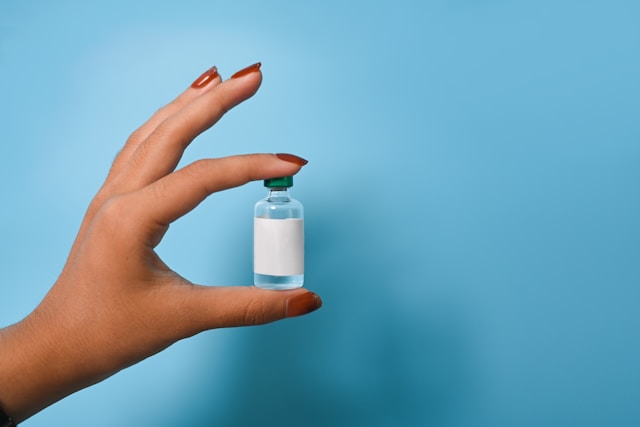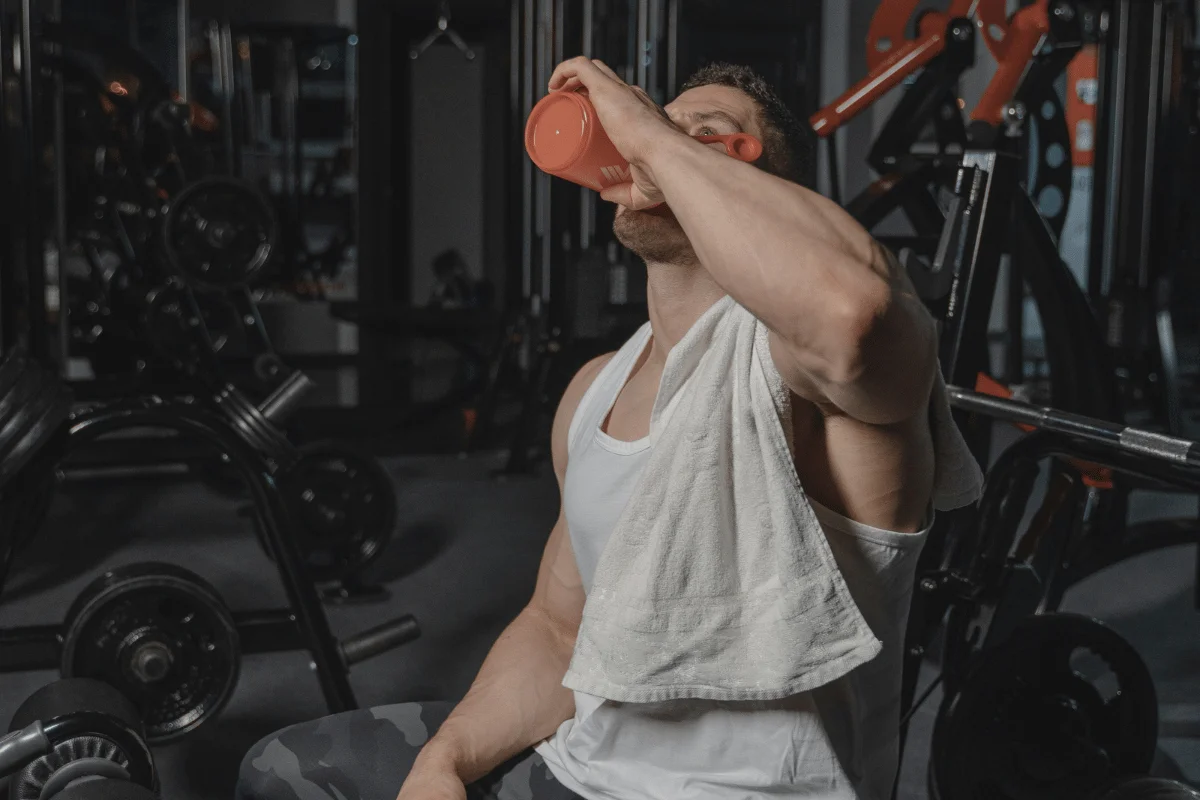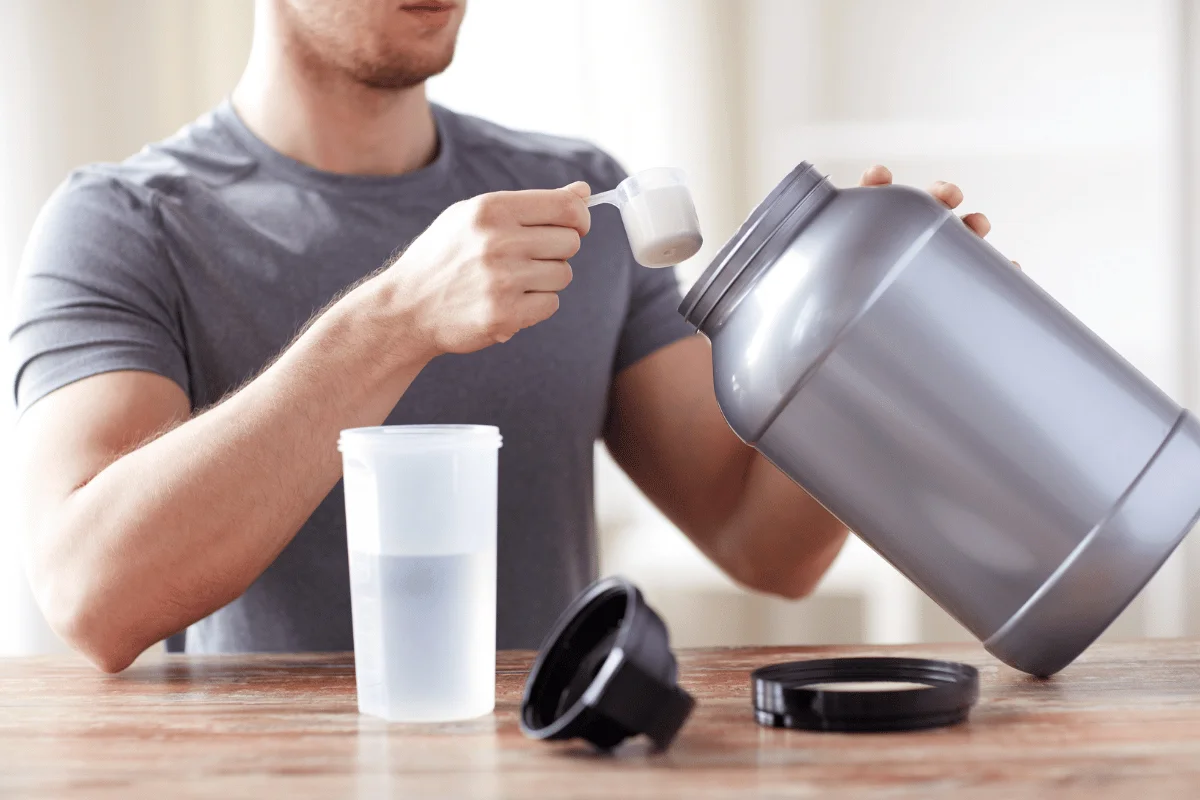This article is for informational purposes only and does not constitute medical advice. Always consult with a qualified healthcare provider before considering any peptide therapy.
Peptides have become one of the most talked-about molecules in muscle development circles. These short chains of amino acids act as biological signaling molecules that can influence growth hormone production, muscle protein synthesis, and tissue repair. But separating science from hype remains a challenge in this rapidly evolving field.
The appeal is clear: peptides offer a potentially more targeted approach to muscle growth compared to traditional methods. Yet questions about effectiveness, safety, and legality continue to shape the conversation around their use.
Quick Takeaways
- Growth hormone secretagogues like CJC-1295 can raise IGF-1 levels by 1.5 to 3 times for up to 28 days. However, the evidence linking this to muscle growth in healthy adults is still limited.
- Collagen peptides have the strongest clinical evidence, increasing fat-free mass by 4.2 kg compared to 2.9 kg in placebo groups when combined with resistance training.
- BPC-157 and TB-500 show tissue repair benefits in animal studies, but human clinical trials are very limited.
- The FDA started enforcing stricter rules on compounded peptide therapies in January 2025. WADA bans most muscle-building peptides for athletes.
What Are Peptides and How Do They Build Muscle?
Peptides are short chains of amino acids that are joined together. They contain between 2 and 50 amino acids.
The small size of peptide molecules means they can penetrate the body’s cells more easily than larger protein molecules. This means that they can more effectively stimulate processes that enhance muscle growth and athletic performance in the body.
How Peptides Support Muscle Growth: The Science
Peptides exert their muscle-building effects through a combination of various mechanisms that often overlap. Arguably, the most important is their action on the growth hormone cascade.
Growth hormone secretagogues activate the pituitary gland to secrete human growth hormone (HGH). HGH, in turn, promotes insulin-like growth factor 1 (IGF-1) production in the liver. This creates an environment that is conducive to muscle protein synthesis[1].
IGF-1 plays a vital role in muscle growth. Studies indicate that IGF-1 augments skeletal muscle protein synthesis via the PI3K/Akt/mTOR and PI3K/Akt/GSK3β pathways (intracellular signaling cascades)[2].
These signaling pathways activate the cellular processes that are involved in the production of new muscle proteins. In addition, IGF-1 also inhibits muscle protein breakdown by repressing the FoxO family of transcription factors and activating muscle stem cells (satellite cells) that are involved in muscle growth and repair.
Top 6 Peptides for Muscle Growth: Evidence and Effects

The peptide landscape includes several compounds with varying levels of scientific support. Understanding what research actually shows about each helps set realistic expectations.
1. Growth Hormone Secretagogues
Sermorelin, Ipamorelin and CJC-1295 are the most frequently discussed growth hormone secretagogues when it comes to muscle building.
Sermorelin is a GHRH analog. It causes the pituitary to release GH in a pulsatile manner, similar to its natural release patterns.
Clinical evidence for CJC-1295 shows sustained increases in both GH and IGF-1 levels. A 2006 study in the Journal of Clinical Endocrinology & Metabolism found that injections under the skin maintained elevated IGF-1 levels for up to 28 days with no serious adverse reactions. The study showed CJC-1295 produced a 1.5 to 3-fold increase in IGF-1 concentrations[3].
Ipamorelin produces shorter but more intense GH pulses with a half-life of approximately 2 hours (meaning half the compound is eliminated from your body in that time). When combined with CJC-1295, this creates a theoretically synergistic effect.
However, published peer-reviewed trials showing superior muscle mass in healthy, resistance-trained adults remain lacking.
Typical Dosing:
| Peptide | Dose | Frequency | Administration |
|---|---|---|---|
| Sermorelin | 200-300 mcg | 3-5 nights/week | Under the skin, before bed |
| Ipamorelin | 200-300 mcg | Daily or as needed | Under the skin |
| CJC-1295 | 500-1000 mcg | Weekly | Under the skin |
2. IGF-1
IGF-1 is perhaps the most extensively studied growth factor with regard to muscle growth. Local infusion of IGF-1 into rat skeletal muscle produced significant increases in total DNA content, protein accretion, and muscle mass[4].
In experiments where transgenic mice overexpressed IGF-1, muscle growth was demonstrated with increases in muscle mass of 24% to 56%[5]. However, adult normal muscles were not responsive to elevated levels of IGF-1 after a steady state had been reached. This finding has led to the current concept that a growth stimulus (such as exercise or injury) must be present in order for IGF-1 to stimulate skeletal muscle growth.
The dose-response relationship is also important. A recent study demonstrated that resistance training and adequate protein feeding synergistically increased IGF-1 levels and increased both muscle mass and strength. The effects of resistance training on circulating versus intramuscular IGF-1 demonstrates that the effects of IGF-1 are mediated by local, and not systemic, mechanisms[6].
3. BPC-157
Body Protection Compound-157 (BPC-157) is a 15-amino acid peptide from human gastric juice. It has attracted attention for its regenerative properties.
Animal studies show that BPC-157 helps skeletal muscle cells move and improves healing by increasing the expression of paxillin and vinculin, which are proteins that assist cells in moving and sticking together[7].
Research indicates that BPC-157 speeds up muscle healing after crush injuries in animal models. When given either systemically or locally, BPC-157 results in faster muscle healing and full restoration of function. Notably, BPC-157 completely reversed muscle healing problems caused by corticosteroids[8].
A 2025 review analyzed 36 studies from 1993 to 2024. It found that BPC-157 promotes healing by increasing growth factors and lowering inflammation[9].
However, the exact mechanism remains unclear. Despite encouraging results in animals, there are few human clinical trials. The FDA has raised warnings about potential immune reactions and serious adverse events.
Read our guide for more information on BPC-157’s potential role in muscle growth.
Third-Party Tested, 99% Purity
Order lab-verified peptides from our top recommended vendor.

4. TB-500
TB-500 is a synthetic analogue of the naturally-occurring peptide thymosin beta-4. It acts as an actin regulatory protein (actin is a protein that cells use to move and maintain structure). TB-500 accelerates cell migration, angiogenesis (formation of new blood vessels), and inflammation to enhance tissue repair. It can improve healing of low-oxygen tissues like tendons.
In animal models, TB-500 has been shown to speed up the regeneration of skeletal muscle tissue[10]. It may also help to minimize scar tissue formation. In a study using rats with achilles tendon rupture, those treated with TB-500 had more evenly distributed collagen fibers and significantly improved strength after 4 weeks[11].
Loading doses of 4-8 mg per week are usually associated with users seeing results within 7-14 days. However, timelines to full recovery vary on a case-by-case basis and are also determined by the severity of the injury and other factors such as nutrition, sleep, and training volume.
Read more about TB-500 dosing for bodybuilding and the differences between TB-500 and Thymosin Beta-4.
5. Myostatin Inhibitors
Myostatin acts as a key negative regulator of skeletal muscle growth (it stops muscles from growing too much). Peptide-based myostatin inhibitors have shown promise in animal studies.
Research published in ACS Medicinal Chemistry Letters in 2022 described the development of MID-35, a stable myostatin inhibitory peptide that increased lower leg muscle mass by 33% compared to baseline in mice[12].
The modified peptides MIF1 and MIF2 not only boost muscle growth by inhibiting myostatin but also reduce fat cell proliferation.
6. Collagen Peptides
Unlike experimental growth hormone secretagogues, collagen peptides have considerable clinical evidence supporting their effectiveness for muscle-related outcomes.
A 2015 study in men with sarcopenia (age-related muscle loss) showed that 15 g daily collagen peptide supplementation combined with resistance training resulted in an average increase of 4.2 kg of fat-free mass versus 2.9 kg in the placebo group. This marked a 45% greater increase. The study also showed increased muscle strength and greater fat mass reduction[13].
A 2024 systematic review with meta-analysis published in the Journal of Sports Sciences found considerable evidence of improvements in fat-free mass, tendon structure, muscle mass, maximal strength, and recovery following exercise-induced muscle damage[14].
The absorption and molecular weight of collagen peptides matter for effectiveness. Peptides in the range of 2000 to 3500 daltons show superior absorption compared to those around 5000 daltons. The high content of proline and glycine makes them particularly valuable for connective tissue repair.
Collagen Peptides Benefits:
- Increase fat-free mass when combined with resistance training
- Support tendon and ligament health
- Improve recovery from exercise-induced muscle damage
- Boost maximal strength development
- Promote connective tissue repair
What Do Experts Say About Muscle-Building Peptides?
The peptide therapy landscape includes advocates and skeptics with legitimate concerns on both sides.
Dr. Andrew Huberman, neuroscientist and professor at Stanford University, has noted that injury appears important for BPC-157 to function effectively, with evidence suggesting it creates new blood vessels and stimulates cell growth at injury sites. Huberman points out that peptides work by targeting specific receptors or pathways.
However, Dr. Karl Nadolsky, an endocrinologist and former NCAA Division I wrestler, offers a more cautious perspective: “I would never personally take or suggest anyone take any of these peptides without clear clinical evidence for benefit in treating a disease.”
💡PEPTIDE PICKS: MORE TO EXPLORE
- Discover how BPC-157 accelerates tendon and ligament healing for faster return to training.
- Learn about peptides specifically for men including testosterone optimization and performance improvement.
- Explore the science behind IGF-1 LR3 for muscle growth and how it compares to other options.
Are Peptides Safe for Muscle Growth?
Safety concerns around peptides stem from limited human trials and unclear long-term effects. Most compounds used for muscle growth remain experimental.
FDA Approval Status and Regulatory Concerns
Very few peptides have received FDA approval for clinical use. Approved options include semaglutide and tirzepatide for type 2 diabetes and weight management, tesamorelin for HIV-associated lipodystrophy, and bremelanotide for sexual dysfunction.
Growth hormone secretagogues like ipamorelin, sermorelin, and CJC-1295 remain unapproved for muscle-building purposes. The FDA has issued warnings about compounded medications containing experimental peptides, noting insufficient information to determine safety.
From January 2025, the FDA began enforcing stricter restrictions on bulk substances used in compounded peptide therapies. This policy shift is phasing out smaller non-compliant compounders and elevating firms capable of navigating full FDA review processes.
Potential Side Effects and Long-Term Risks
While peptides are often marketed as safer alternatives to anabolic steroids, major safety concerns remain. The FDA notes immunogenicity concerns and reports of serious adverse events, especially with compounded products.
Potential risks associated with chronic growth hormone elevation include:
- Increased cancer risk, particularly for those with existing tumors
- Insulin resistance and diabetes development
- Joint pain and swelling
- Water retention
- Altered glucose metabolism
The long-term safety profile of most muscle-building peptides remains unknown. Unlike FDA-approved medications that undergo Phase I, II, and III clinical trials, most peptides used for muscle growth have minimal human safety data.
WADA Prohibited Status for Athletes
Growth hormone, its fragments, and growth hormone-releasing factors are prohibited at all times by the World Anti-Doping Agency (WADA). This includes growth hormone secretagogues like ipamorelin, sermorelin, CJC-1295, and capromorelin (MK-677).
BPC-157 was recently banned by WADA as a “non-approved substance,” and TB-500 also appears on WADA’s prohibited list. Athletes who test positive face sanctions, and many professional sports leagues have banned their use.
How to Use Peptides for Muscle Growth

For those who choose to explore peptide therapy under medical supervision, understanding proper protocols is necessary. However, no standardized, FDA-vetted protocols exist for muscle-building goals in healthy adults.
Typical Dosing Protocols by Peptide Type
The dosing regimens used come from clinical trials designed to map how the drug moves through the body rather than optimize bodybuilding results. Common protocols include:
- BPC-157: 200-500 mcg under the skin once or twice daily for 4-6 weeks, often cycled with periods off
- TB-500: Loading dose of 4-8 mg per week for 4-6 weeks, followed by maintenance doses of 2-4 mg per week
- Collagen peptides: 15 g daily, typically taken post-workout
- CJC-1295/Ipamorelin combination: Varies based on individual protocols and goals
Administration Methods and Cycling Strategies
Most peptides require injection under the skin or into muscle, as oral administration would result in degradation by digestive enzymes. The exception is collagen peptides, which are typically consumed orally as powders mixed into beverages.
Peptide sourcing remains a critical concern. The presence of bacterial contaminants poses risks with poorly manufactured peptides. Medical-grade peptides from verified compounding pharmacies operating under proper regulations are necessary for minimizing contamination risks.
Many practitioners recommend cycling peptides to prevent receptor desensitization and maintain effectiveness. A common approach involves 8-12 week “on” periods followed by 4-8 week breaks. Some protocols combine multiple peptides, such as pairing growth hormone secretagogues with tissue repair peptides.
See our guide for comprehensive information on safe bodybuilding peptides. You can also read more about popular peptide stacks like the Wolverine Stack for advanced protocols.
Peptides vs. Traditional Muscle-Building Methods
Peptides should be viewed as potential adjuncts rather than replacements for proven muscle-building strategies. Resistance training, adequate protein intake (1.6-2.2 g/kg body weight), sufficient sleep, and proper recovery remain the foundation of muscle growth.
No peptide can compensate for deficiencies in these areas. Studies consistently show that training stimulus combined with proper nutrition drives muscle adaptation. The role of peptides, if any, would be to potentially improve recovery or create a slightly more favorable hormonal environment.
With collagen peptides showing the strongest evidence base and established safety profile, they offer the lowest-risk peptide intervention with proven benefits. The 15 g daily dose combined with resistance training has strong support from multiple randomized controlled trials.
For other peptides, particularly growth hormone secretagogues and tissue repair compounds, the evidence remains primarily from animal studies or anecdotal reports. The gap between theoretical promise and clinical proof remains large.
Bottom Line
Peptides for muscle growth exist in a field characterized by more questions than answers. While biological mechanisms are compelling and early evidence suggests potential benefits, the gap between theoretical promise and clinical proof remains large for most compounds.
Collagen peptides stand out with multiple randomized controlled trials showing modest but real benefits when combined with resistance training. For other peptides, particularly growth hormone secretagogues and tissue repair compounds like BPC-157, the evidence remains primarily from animal studies.
The regulatory crackdown beginning in 2025 signals a maturation of the field, potentially separating legitimate therapeutic applications from wellness industry hype. The most prudent approach prioritizes proven strategies while viewing peptides as potential adjuncts requiring careful consideration of risks, regulations, and realistic expectations.
Frequently Asked Questions
What are the best peptides for muscle growth?
Collagen peptides have the strongest clinical evidence, showing a 45% greater increase in fat-free mass compared to placebo when combined with resistance training. Growth hormone secretagogues like CJC-1295 and ipamorelin can increase IGF-1 levels but lack strong evidence linking this to muscle gains in healthy adults.
Are peptide therapies safe for building muscle?
Most muscle-building peptides remain experimental with limited long-term safety data. Collagen peptides have an established safety profile. Growth hormone secretagogues carry potential risks including altered glucose metabolism, joint pain, and unknown long-term effects. Always work with licensed physicians who can monitor bloodwork.
How long does it take to see results from peptides?
Timeframe varies by peptide type. TB-500 users typically report results within 7-14 days, collagen peptides show benefits after 12 weeks of combined use with resistance training, and growth hormone secretagogues may produce hormonal changes within weeks but muscle composition changes remain unclear.
Can athletes use peptides for muscle growth?
Most muscle-building peptides are prohibited by WADA, including all growth hormone secretagogues, BPC-157, and TB-500. Athletes who test positive face sanctions. Collagen peptides are generally permitted but check specific sport regulations.
Do peptides work better than protein supplements for muscle growth?
Collagen peptides complement but don’t replace complete protein sources. Research shows benefits when combined with resistance training and adequate protein intake (1.6-2.2 g/kg body weight). Growth hormone secretagogues have not been proven superior to proper training and nutrition in healthy adults.
What are the side effects of muscle-building peptides?
Common side effects include injection site reactions, water retention, joint pain, and altered blood glucose. More serious concerns include potential increased cancer risk with chronic growth hormone elevation, immune reactions, and contamination risks from poorly manufactured products. Long-term effects remain unknown for most peptides.
References
- Sigalos JT, Pastuszak AW. The Safety and Efficacy of Growth Hormone Secretagogues. Sexual Medicine Reviews. Oxford University Press (OUP); 2018;6:45–53. https://doi.org/10.1016/j.sxmr.2017.02.004
- Yoshida T, Delafontaine P. Mechanisms of IGF-1-Mediated Regulation of Skeletal Muscle Hypertrophy and Atrophy. Cells. MDPI AG; 2020;9:1970. https://doi.org/10.3390/cells9091970
- Teichman SL, Neale A, Lawrence B, Gagnon C, Castaigne J-P, Frohman LA. Prolonged Stimulation of Growth Hormone (GH) and Insulin-Like Growth Factor I Secretion by CJC-1295, a Long-Acting Analog of GH-Releasing Hormone, in Healthy Adults. The Journal of Clinical Endocrinology & Metabolism. The Endocrine Society; 2006;91:799–805. https://doi.org/10.1210/jc.2005-1536
- Adams GR, McCue SA. Localized infusion of IGF-I results in skeletal muscle hypertrophy in rats. Journal of Applied Physiology. American Physiological Society; 1998;84:1716–1722. https://doi.org/10.1152/jappl.1998.84.5.1716
- Shavlakadze T, Chai J, Maley K, Cozens G, Grounds G, Winn N, et al. A growth stimulus is needed for IGF-1 to induce skeletal muscle hypertrophy in vivo. Journal of Cell Science. The Company of Biologists; 2010;123:960–971. https://doi.org/10.1242/jcs.061119
- Baek K-W, Won J-H, Kim C-B, Park J-J. Correlation between physiological and biochemical variables during short term adequate protein intake combined with resistance exercise in sedentary adults. Scientific Reports. Springer Science and Business Media LLC; 2025. https://doi.org/10.1038/s41598-025-89925-x
- Wang S-H. BPC 157 Promotes Skeletal Muscle Cells Migration in Association with Up-regulation of Paxillin and Vinculin Expression. Rehabilitation Practice and Science. Taiwan Academy of Physical Medicine and Rehabilitation; 2019. https://doi.org/10.6315/tjpmr.201906_47(1).0003
- Pevec D, Novinščak T, Brčić L, Sipos K, Jukić I, Starešinić M, et al. Impact of pentadecapeptide BPC 157 on muscle healing impaired by systemic corticosteroid application. Medical Science Monitor. 2010;16(3):BR81–88.
- Vasireddi N, Hahamyan H, Salata MJ, Karns M, Calcei JG, Voos JE, et al. Emerging Use of BPC-157 in Orthopaedic Sports Medicine: A Systematic Review. HSS Journal®: The Musculoskeletal Journal of Hospital for Special Surgery. SAGE Publications; 2025;21:485–495. https://doi.org/10.1177/15563316251355551
- Maar K, Hetenyi R, Maar S, Faskerti G, Hanna D, Lippai B, et al. Utilizing Developmentally Essential Secreted Peptides Such as Thymosin Beta-4 to Remind the Adult Organs of Their Embryonic State—New Directions in Anti-Aging Regenerative Therapies. Cells. MDPI AG; 2021;10:1343. https://doi.org/10.3390/cells10061343
- Farcic TS, Baldan CS, Machado AFP, Caffaro LAM, Masson IFB, Casarotto RA. Collagen Fibers in the Healing Process of Rat Achilles Tendon Rupture Using Different Times of Ultrasound Therapy. Advances in Wound Care. Mary Ann Liebert Inc; 2018;7:114–120. https://doi.org/10.1089/wound.2017.0748
- Takayama K, Hitachi K, Okamoto H, Saitoh M, Odagiri M, Ohfusa R, et al. Development of Myostatin Inhibitory d-Peptides to Enhance the Potency, Increasing Skeletal Muscle Mass in Mice. ACS Medicinal Chemistry Letters. American Chemical Society (ACS); 2022;13:492–498. https://doi.org/10.1021/acsmedchemlett.1c00705
- Holwerda AM, van Loon LJC. The impact of collagen protein ingestion on musculoskeletal connective tissue remodeling: a narrative review. Nutrition Reviews. Oxford University Press (OUP); 2022;80:1497–1514. https://doi.org/10.1093/nutrit/nuab083
- Bischof K, Moitzi AM, Stafilidis S, König D. Impact of Collagen Peptide Supplementation in Combination with Long-Term Physical Training on Strength, Musculotendinous Remodeling, Functional Recovery, and Body Composition in Healthy Adults: A Systematic Review with Meta-analysis. Sports Medicine. Springer Science and Business Media LLC; 2024;54:2865–2888. https://doi.org/10.1007/s40279-024-02079-0







